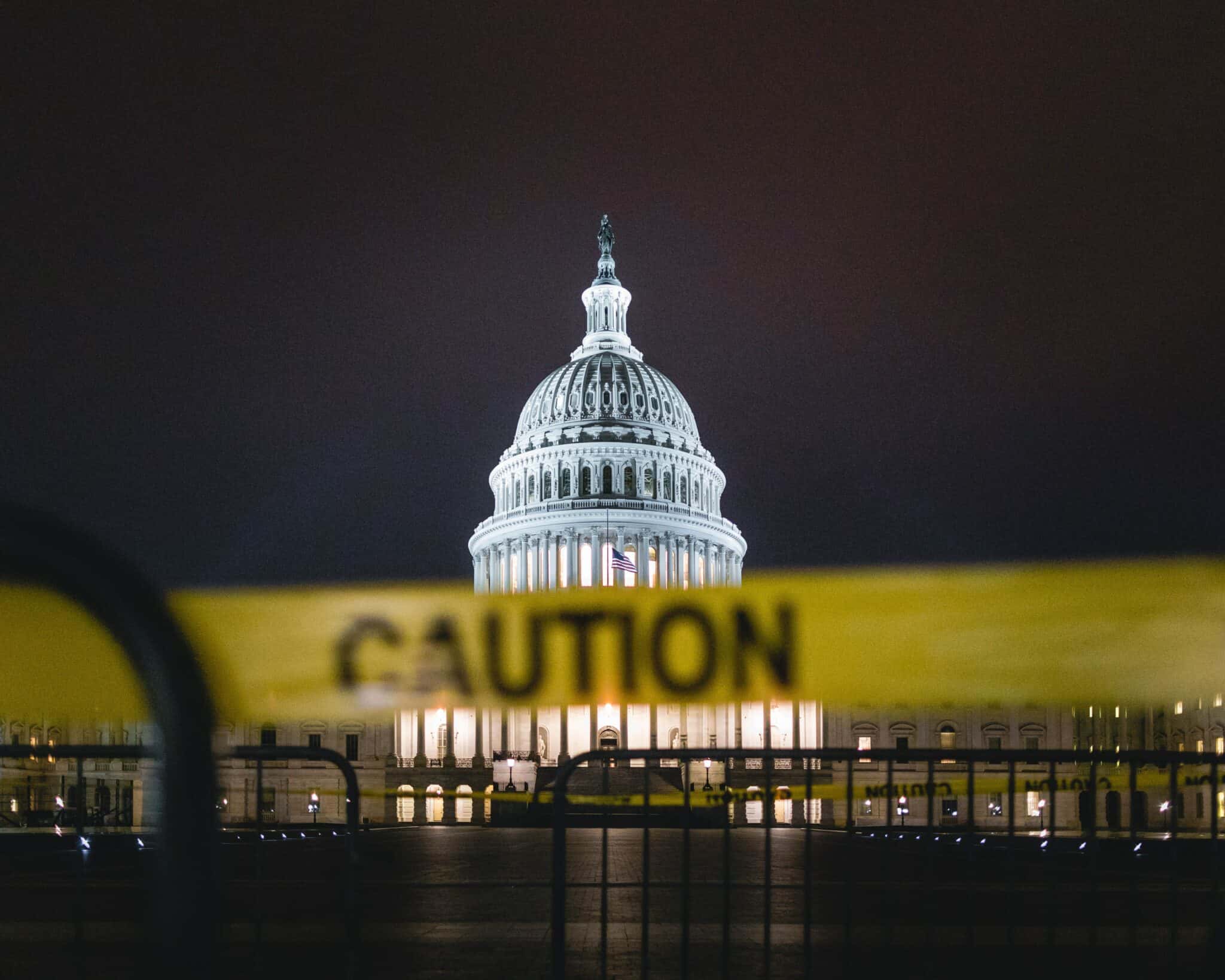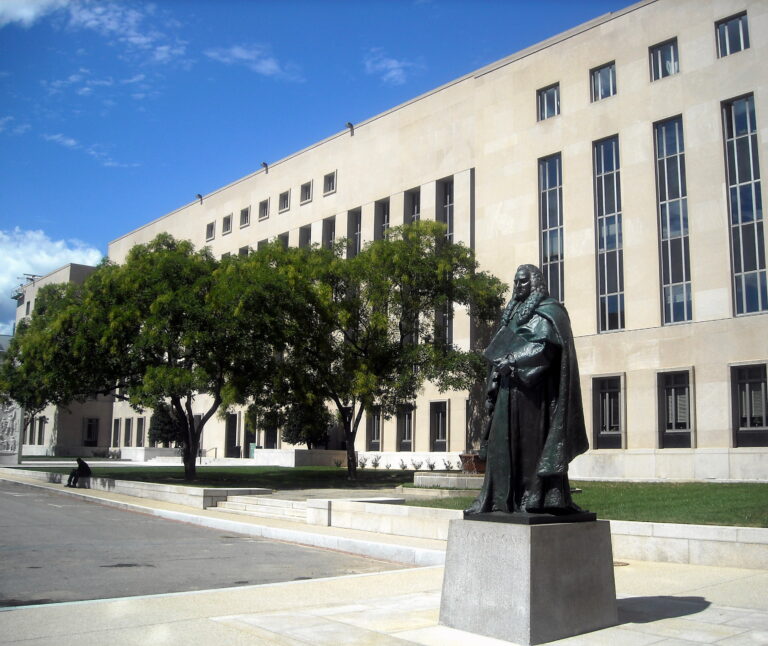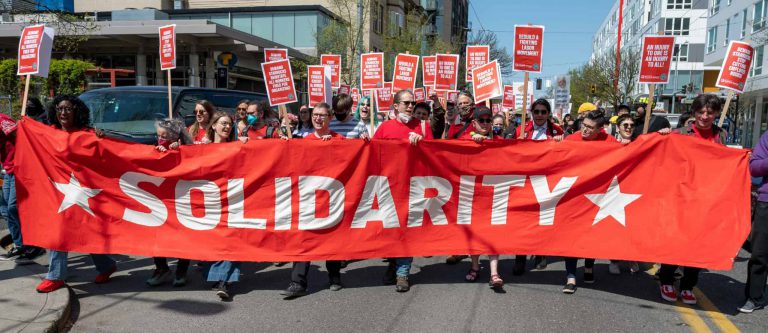
Kevin Vazquez is a staff attorney at the International Brotherhood of Teamsters. He graduated from Harvard Law School in 2023. The opinions he expresses on this blog are his own and should not be attributed to the IBT.
The fallout from Wednesday’s violence at the Capitol, which resulted in five deaths, among them Brian Sicknick, a Capitol Police officer, continued this weekend. U.S. unions and labor leaders have forcefully condemned the events, and many have likened it to an attempted coup. AFL-CIO President Richard Trumka called it “one of the greatest assaults on our democracy since the Civil War”; UAW President Rory Gamble said the “deliberate and despicable attempt by extremists to disrupt our great republic” was “a very sad day for our nation and our democracy”; and the United Steelworkers, the largest private-sector union in the country, called the riot an act of “domestic terrorism” caused by Trump’s “inflammatory rhetoric.” Powerful corporations and business leaders also spoke out against the violence – ignoring, in many cases, their own roles in Donald Trump’s rise, which often included tens of thousands in donations to his campaign or the campaigns of other Republicans who supported the efforts to overturn the results of November’s election.
Meanwhile, prominent Democrats, including Speaker of the House Nancy Pelosi and Senate Minority Leader (until the Georgia special election results are certified) Chuck Schumer, have called on President Trump to resign. If he refuses, Speaker Pelosi has said that House Democrats will introduce legislation for an unprecedented second impeachment of the President for “incitement of an insurrection,” possibly as soon as Monday, as a response to his role in Wednesday’s events. Four US Presidents have been impeached before, including Trump in December 2019, but none have been impeached twice.
According to an internal memo circulated by Senate Majority Leader Mitch McConnell obtained by the Washington Post, the Senate, which is in recess until January 19, could not begin an impeachment hearing before the inauguration of Joe Biden the following day, although the trial could continue – led by Chuck Schumer – after Biden has been inaugurated. There is some disagreement among experts whether a Senate trial could be held for a president who is no longer in office. In any event, conviction by the Senate, which requires the approval of 67 Senators, remains a remote possibility – even though some Republican Senators, like Sen. Ben Sasse of Nebraska, Sen. Lisa Murkowski of Alaska, and Sen. Pat Toomey of Pennsylvania, have indicated a willingness to consider the charges against President Trump.
If President Trump is impeached by the House for the second time next week, it would not be the last historic moment in his unprecedented presidency. Trump announced on Friday that he would not be attending the inauguration of Joe Biden and Kamala Harris, which is seen as a hallmark of the peaceful transition of power in the United States. If he refuses to attend his successor’s inauguration, he would be the first outgoing president to do so since Andrew Johnson in 1869. There continues to be speculation that Trump is privately considering the possibility of launching a competing event during the inauguration to announce his own 2024 presidential campaign. Vice President Mike Pence, in his second public break with the President this week, has said that he will attend the inauguration.
In other political news, President-elect Biden said he “gave serious consideration” to Sen. Bernie Sanders for Labor Secretary, a position for which Sanders, who made workers’ rights a centerpiece of both his 2016 and 2020 presidential efforts, privately campaigned. Many progressive activists — to the consternation of business groups — appealed to Biden to select Sanders, an outspoken supporter of labor issues and unions. Biden, citing the importance of maintaining Senate control after the Georgia runoff elections on Tuesday, which, he said, would be put “at risk on the outcome of a special election in Vermont” if Sanders was selected, opted instead for Boston mayor and former union leader Marty Walsh. Sanders will instead assume the influential position of Chair of the Senate Budget Committee as a result of Warnock and Ossoff’s victories in Georgia on Tuesday. Expectations are high for Walsh, although Eugene Scalia, the current Labor Secretary and former management-side labor lawyer and corporate lobbyist, has set the bar as low as possible.
Biden offered Sanders, a fierce opponent of his in the 2020 Democratic primary, some conciliatory praise, calling him a “passionate ally to working people in this country” and saying that the two – who did not always see eye-to-eye on the campaign trial – would “work closely on [their] shared agenda, on increasing working power to protect the dignity of work.” Perhaps evidencing this shared agenda, Biden said on Friday that he is in favor of deficit spending “in order to generate economic growth.” Sanders praised his comments, saying “the President-elect is exactly right that this is not the time for austerity politics” that have “allowed the very rich to do phenomenally in this country while working people suffer.”
On Friday, the Department of Labor announced that, since the start of the pandemic, OSHA has issued citations arising from 300 inspections for “violations relating to the coronavirus,” which have resulted in proposed penalties totaling nearly $4,000,000. OSHA cited employers for violations such as failing to implement a written respiratory protection program, provide training on the proper use of personal protective equipment, report an illness or fatality, or comply with the General Duty Clause of the Occupational Safety and Health Act of 1970. This is welcome news, but it will likely do little to quell the harsh criticism that OSHA has received for its failures to protect workers or respond to complaints regarding the virus. A Reuters Special Report released on Wednesday, for example, identified 106 workplaces in which workers had filed a complaint with OSHA. According to Reuters’ analysis, the agency failed to inspect 70 of those workplaces, and only 12 of them had been penalized as a result of employee complaints. Even in workplaces designated “high exposure risk,” the Reuters analysis found that only about 15 percent of complaints led to an inspection, and only 20 percent of inspections led to a fine. Members of President-elect Biden’s COVID-19 task force, like David Michaels, head of OSHA during the Obama administration, have also criticized the agency’s lackluster response.
Finally, on Thursday, a six percent rise in shares in Tesla led to Elon Musk’s surpassing Jeff Bezos to become the richest man on the planet. Lest any rivalries arise between them, we take this opportunity to remind the two that, despite their competition atop the list of largest global plutocrats, they have much more in common than dividing them, like a shared history of labor violations; frequently-illegal anti-union crusades; and workers who complain about long hours, unsafe working conditions, and low pay and are, in many cases, receiving assistance from SNAP or other welfare programs.






Daily News & Commentary
Start your day with our roundup of the latest labor developments. See all
April 24
NLRB seeks to compel Amazon to collectively bargain with San Francisco warehouse workers, DoorDash delivery workers and members of Los Deliveristas Unidos rally for pay transparency, and NLRB takes step to drop lawsuit against SpaceX over the firing of employees who criticized Elon Musk.
April 22
DOGE staffers eye NLRB for potential reorganization; attacks on federal workforce impact Trump-supporting areas; Utah governor acknowledges backlash to public-sector union ban
April 21
Bryan Johnson’s ULP saga before the NLRB continues; top law firms opt to appease the EEOC in its anti-DEI demands.
April 20
In today’s news and commentary, the Supreme Court rules for Cornell employees in an ERISA suit, the Sixth Circuit addresses whether the EFAA applies to a sexual harassment claim, and DOGE gains access to sensitive labor data on immigrants. On Thursday, the Supreme Court made it easier for employees to bring ERISA suits when their […]
April 18
Two major New York City unions endorse Cuomo for mayor; Committee on Education and the Workforce requests an investigation into a major healthcare union’s spending; Unions launch a national pro bono legal network for federal workers.
April 17
Utahns sign a petition supporting referendum to repeal law prohibiting public sector collective bargaining; the US District Court for the District of Columbia declines to dismiss claims filed by the AFL-CIO against several government agencies; and the DOGE faces reports that staffers of the agency accessed the NLRB’s sensitive case files.